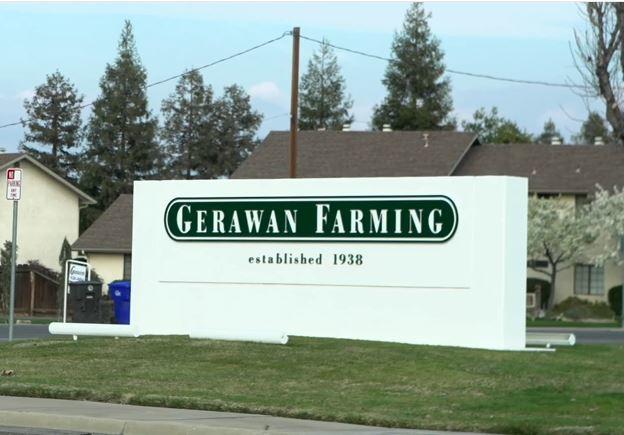Labor & Economy
Conservative Groups Rally Behind Gerawan Farming

As this fight unfolds, national anti-union organizations are moving in. The far-right Center for Constitutional Jurisprudence joined the appeals case. In recent years the Center has joined the Harris v. Quinn suit against the Service Employees International Union in Illinois, sued the California Labor Commissioner on behalf of employers, argued for Hobby Lobby stores against providing birth control for their employees, and supported the initiative to end affirmative action in Michigan.
Furthermore, the Center for Worker Freedom, headquartered in the Washington, D.C. offices of Grover Norquist’s Americans for Tax Reform (ATR), publicized the demonstration calling for the decertification of the United Farm Workers (UFW) outside the Visalia office of the Agricultural Labor Relations Board (ALRB). The Center’s director, Matt Patterson, wrote an editorial for Forbes.com, extolling Lopez and charging that “farm workers in California’s Central Valley are finding their civil liberties stripped from them today — by a government agency … [that] wants to force the union on Gerawan until the election is ‘investigated.'”
See Part 1: Growers Move to Gut California’s Farm Labor Law
Last year Patterson bought billboards to attack the United Auto Workers at the new Volkswagen plant in Chattanooga, Tennessee. Copying the same strategy, the Center then bought billboards in Sacramento attacking the UFW and the ALRB.
The Gerawans’ local Republican congressman, Devin Nunes, is a grower who criticized President Obama for opposing the use of torture. Republican Kevin McCarthy is the House Majority Leader representing neighboring Bakersfield. Both are allies of ATR, a key opponent of mandatory mediation and which is funded by Karl Rove’s Crossroads GPS and the Koch brothers, among other conservative sources.
Much of the San Joaquin Valley is very conservative Republican territory. In The Perfect Fruit, author Chip Bradley quotes Ray Gerawan: “My philosophy is survival of the fittest. In this family, we’re real big on free enterprise.” He says his ambition is “to put my competitors out of business … because that makes us all stronger.”
When the Gerawans are criticized, they react with hardball tactics. After the city of Berkeley passed a resolution like the one approved by Los Angeles’ City Council, it got a swift and threatening response. Company attorney David Schwarz wrote a four-page letter to its city council. “Republication of libelous statements,” he fumed, “whether in newsletters, press releases, constituent updates, or speeches outside the legislative chamber, is not immunized from liability…”
Gerawan sympathizers also piled on. Katy Grimes, who writes for the Watchdog Wire blog (a project of the pro-free-market Franklin Center for Government and Public Integrity), called the resolution’s authors “liberal busybodies.”
And, after reading an op-ed piece last June that was written by former California Supreme Court Justice Cruz Reynoso and UFW President Arturo Rodriguez, and which urged the company to negotiate with its workers, Dan Gerawan sent Reynoso a threatening letter. At the end of eight pages it demanded “that you disavow authorship of the article. If you refuse to do so, then we ask that you correct the false and misleading statements made in the article, and retract these defamatory statements. The retraction must be complete and unequivocal.”
Reynoso, who had been removed from the state Supreme Court in 1986 following a right-wing recall drive, politely refused.
This year the Gerawans’ local state Assembly member, Republican Jim Patterson of Fresno, introduced Assembly Bill 1389. It would allow outside anti-union parties (such as Silvia Lopez) to inject themselves into mandatory mediation proceedings on the same basis as the union’s elected negotiating committee. Further, it would permit growers to decertify unions that “abandon” workers for three years, an obvious reference to Gerawan, which has used that language to describe the UFW’s 20-year absence from its fields. Both measures would make mandatory mediation essentially inoperable.
Despite the threats and name-calling, city councils in New York City and Washington D.C. are taking up measures like Los Angeles’. The grower’s biggest buyer is Walmart, an inviting target for people already angry at that chain’s treatment of its own workers. After the L.A. City Council vote, Maria Elena Durazo, then the head of the county labor federation, warned Gerawan Farming of a possible boycott: “You will not be welcome in the stores of Los Angeles if that’s the next thing these workers ask us to do.”
Boycotts can take time to have an effect — the original UFW grape boycott lasted five years. And once started, they’re hard to stop. But targeted boycotts have been very successful in recent years at forcing garment companies selling clothes on college campuses to recognize unions in sweatshops. The Farm Labor Organizing Committee won an agreement covering thousands of North Carolina farm workers several years ago by successfully boycotting Mount Olive pickles. By taking on the largest consumers of Gerawan’s Prima brand fruit, such as school districts, the UFW could make a big dent in sales. Cesar Chavez believed that cutting off five percent of sales was normally enough to make a boycott successful.
The Impact of Decertification
Decertification is more than just the key to undoing the original election that required Gerawan to bargain. If holding an election can’t actually lead to a contract, there’s not much reason for workers anywhere to risk their jobs supporting a union. Growers far beyond Gerawan, therefore, have an interest in the outcome — the reason why the Grape and Tree Fruit League and national conservative groups are paying attention.
A stronger union in California fields could raise wages (and growers’ labor costs), which are far lower now than they were 30 years ago when the UFW was at its strongest. One recent study found that tens of thousands of Mexican indigenous farm workers in California receive less than minimum wage. It is common today to find workers sleeping in cars in parking lots during the grape picking season, or even under trees and on hillsides. Outside the state wages and living conditions are often worse.
The Agricultural Labor Relations Board’s responsibility is to make the election and negotiation process work. This March Governor Jerry Brown appointed William Gould IV chair of the ALRB. Gould, who is the board’s first African American chair, is an emeritus law professor at Stanford University and former chair of the National Labor Relations Board under President Bill Clinton.
In the Senate Rules Committee hearing on his nomination, he told legislators that he wanted “to make mediation and conciliation more streamlined, so parties don’t wait months.” In the case of labor law violations he advocated using temporary injunctions to get relief “without waiting years for them to play out.”
The board’s operations, however, are constrained by reduced budgets. To make the process work faster the ALRB needs more hearing officers and staff, which means Gould will have to use his political skills to convince the Governor and legislature to give it more money.
Meanwhile, enforcement of the mediator’s contract at Gerawan seems far away to the company’s workers. While the grower continues to operate without it, UFW supporters like Severino Salas say they face retaliation.
“I’ve worked for Gerawan since 1999,” he told Capital & Main. “The foreman realized I was for the union when they began passing around the petition and I wouldn’t sign it.” He and his wife were denied work in their normal crew. “What the company really wants is for us to quit,” he charges.
(David Bacon is a California writer and photographer, covering labor, immigration and globalization. His latest book is The Right to Stay Home – How U.S. Policy Drives Mexican Migration.)

-

 The SlickJanuary 23, 2026
The SlickJanuary 23, 2026Yes, the Energy Transition Is Coming. But ‘Probably Not’ in Our Lifetime.
-

 The SlickJanuary 27, 2026
The SlickJanuary 27, 2026The One Big Beautiful Prediction: The Energy Transition Is Still Alive
-

 Column - State of InequalityJanuary 29, 2026
Column - State of InequalityJanuary 29, 2026Are California’s Billionaires Crying Wolf?
-

 Latest NewsFebruary 3, 2026
Latest NewsFebruary 3, 2026Amid the Violent Minnesota Raids, ICE Arrests Over 100 Refugees, Ships Many to Texas
-

 Dirty MoneyJanuary 30, 2026
Dirty MoneyJanuary 30, 2026Amid Climate Crisis, Insurers’ Increased Use of AI Raises Concern For Policyholders
-

 Featured VideoFebruary 4, 2026
Featured VideoFebruary 4, 2026Protesters Turn to Economic Disruption to Fight ICE
-

 The SlickFebruary 2, 2026
The SlickFebruary 2, 2026Colorado May Ask Big Oil to Leave Millions of Dollars in the Ground
-

 Column - State of InequalityFebruary 5, 2026
Column - State of InequalityFebruary 5, 2026Lawsuits Push Back on Trump’s Attack on Child Care


